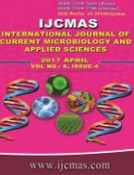


 National Academy of Agricultural Sciences (NAAS)
National Academy of Agricultural Sciences (NAAS)

|
PRINT ISSN : 2319-7692
Online ISSN : 2319-7706 Issues : 12 per year Publisher : Excellent Publishers Email : editorijcmas@gmail.com / submit@ijcmas.com Editor-in-chief: Dr.M.Prakash Index Copernicus ICV 2018: 95.39 NAAS RATING 2020: 5.38 |
The Urban Environment is important for all of us, not least because so many of us live in cities. Cleaner city, healthy life and a better environment are important demands for city dwellers. Due to increase in urbanization rate, population density and per capita production of solid waste is also increasing. According to MSW Rules, 2000, every municipal authority is responsible for setting up a waste processing and disposal facility. Approximately 50 million metric tonnes (115,000 metric tonnes per day) of solid waste is generated every year by the urban population in India. The per capita generation of waste in Indian cities ranges from 0.17 kg to 0.62 kg/capita/day depending upon population size and its socio-economic profile. The quantity and composition of MSW vary from place to place, and bear a rather consistent correlation with the average standard of living. The Nashik city is forth largest urbanised (population) and third most industrialized city in Maharashtra after Mumbai and Pune, its also known as "Wine Capital of India". The in present case study was under taken for Nashik Municipal Corporation as Nashik Municipal Corporation (NMC) is collecting 300-350 Tons MSW per day. To overcome such problem sustainable Municipal Solid Waste Management in Nashik was planned with special reference to 3R strategy- Reduce, Reuse, Recycle. With better collection, transportation measures and collection efficiency. To overcome such over burden of MSW, the NMC upgraded the Khat prakalap to a capacity of 500 to 600 TPD. The NMC started pilot project on Waste to Energy on Private Public Project basis. It's one such solution through co-processing of septage (faecal sludge) with organic solid waste and generating energy to create a sustainable business model. This plant can do the treatment of up to 30 tonnes of waste daily. Resulting into generation of 3,300 kWh per day to be fed into Maharashtra power grid. Reduction of energy cost of NMC due to the expected revenue inflow from feeding the produced electricity into the power grid of the Maharashtra Electricity Board. It will also avoid organic waste going into the landfills of city area.
 |
 |
 |
 |
 |